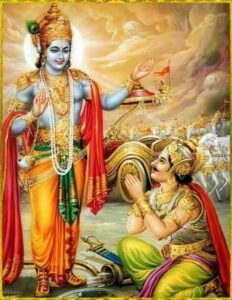srI:
srImathE satakOpAya nama:
srImathE rAmAnujAya nama:
srImath varavaramunayE nama:
Summary of each chapter in first hexade
SlOkam 5
asthAna snEha kAruNya dharmAdharmadhiyAkulam |
pArtham prapannamudhdhiSya SAsthrAvatharaNam krutham ||
Listen
Word-by-word meaning
asthAna snEha kAruNya dharmAdharmadhiyA – due to attachment with and compassion for naturally unfitting relatives (that which does not fit the nature of AthmA), having bewildered intelligence considering ones own righteous war as being unrighteous
Akulam – being shaken
prapannam – being surrendered
pArtham udhdhiSya – towards arjuna
SAsthrAvatharaNam krutham – gIthA SAsthram was initiated (in the first chapter and the first part of the second chapter)
Simple translation
gIthA SAsthram was initiated (in the first chapter and the first part of the second chapter) towards arjuna who is surrendered [to krishNa] after being shaken up due to attachment with and compassion for naturally unfitting relatives (that which does not fit the nature of AthmA) and having bewildered intelligence considering ones own righteous war as being unrighteous.
SlOkam 6
nithyAthmasangakarmEhAgOcharA sAnkyayOgadhee: |
dhvitheeyE sthithadheelakshA prOkthA than mOhaSAnthayE ||
Listen
Word-by-word meaning
nithya Athma asanga karma eehA gOcharA – topics such as eternal AthmA, activities with detachment
sthithadheelakshA – having the state of sthithapragyA (firm in judgement and wisdom) as the goal
sAnkya yOgadhee: – knowledge about self and karma yOgam
than mOha SAnthayE – to eradicate arjuna’s bewilderment
dhvitheeyE – second part of second chapter
prOkthA – instructed
Simple translation
Topics such as eternal AthmA, righteous duties with detachment, having the state of sthithapragyA (firm in judgement and wisdom) as the goal, knowledge about self and karma yOgam were instructed to eradicate arjuna’s bewilderment in the second part of second chapter.
SlOkam 7
asakthyA lOkarakshAyai guNEshvArOpya karthruthAm |
sarvESvarE vAnyasyOkthA thrutheeyE karmakAryathA ||
Listen
Word-by-word meaning
lOkarakshAyai – to protect the people (who don’t have the qualification to engage in gyAna yOgam)
guNEshu – in the qualities that are sathva (tranquility), rajas (passion) and thamas (ignorance)
karthruthAm ArOpya – meditating upon ones doer-ship
sarvESvarE vA nyasya – surrendering such doer-ship unto the supreme lord
asakthyA – without attachment in any goal other than mOksham
karma kAryathA – that, one should perform the duties
thruthIyE ukthA – explained in third chapter
Simple translation
It is explained in the third chapter to protect the people (who don’t have the qualification to engage in gyAna yOgam) that one should perform the prescribed duties meditating upon ones doer-ship which is influenced by the three types of qualities which are sathva (tranquility), rajas (passion) and thamas (ignorance) and surrendering such doer-ship unto the supreme lord and [do those duties] without attachment in any goal other than mOksham.
SlOkam 8
prasangAth svasvabhAvOkthi: karmaNOkarmathAsya cha |
bhEdhA:, gyAnasya mAhAthmyam chathurthAdhyAya uchyathE ||
Listen
Word-by-word meaning
chathurthAdhyAyE – in the fourth chapter
karmaNa: akarmathA uchyathE – karma yOgam (which includes gyAna yOgam) is explained as gyAna yOgam itself
asya bhEdhA: cha [uchyanthE] – the nature and sub-divisions of karma yOgam are explained
gyAnasya mAhAthmyam [uchyathE] – the greatness of true knowledge as well is explained
prasangAth – (to establish the authenticity of his words) incidentally
svasvabhAvOkthi: – discourse on those qualities of his (which do not change even during his incarnations) are explained in the beginning
Simple translation
In the fourth chapter, karma yOgam (which includes gyAna yOgam) is explained as gyAna yOgam itself, the nature and sub-divisions of karma yOgam, the greatness of true knowledge and (in the beginning, to establish the authenticity of his words) incidentally discourse on those qualities of his (which do not change even during his incarnations) are explained.
SlOkam 9
karmayOgasya saukaryam Saigryam kAschana thadhvidhA: |
brahmagyAna prakArascha panchamAdhyAya uchyathE ||
Listen
Word-by-word meaning
karma yOgasya – karma yOgam’s
saukaryam – practicability
Saigryam – aspect of attaining the goal quickly
kAschana thadhvidhA: – those ancillary parts of such karma yOgam
brahma gyAna prakAra: cha – the state of viewing all pure AthmAs at the same level
panchamAdhyAyE – in the fifth chapter
uchyathE – spoken
Simple translation
In the fifth chapter karma yOgam’s practicability, its aspect of attaining the goal quickly, its ancillary parts and the state of viewing all pure AthmAs at the same level are spoken.
SlOkam 10
yOgAbhyAsavidhir yOgee chathurdhA yOgasAdhanam |
yOgasidhdhi: svayOgasya pAramyam shashta uchyathE ||
Listen
Word-by-word meaning
yOgAbhyAsa vidhi: – the method to practice (get familiar with) yOgam (which leads to Athma sAkshAthkAram – self realization)
chathurdhA yOgee – four types of yogis
yOga sAdhanam – exercise, detachment, etc., which leads to such yOgam
yOga sidhdhi: – that, such yOgam (even if there is a break) will eventually succeed
svayOgasya pAramyam – the greatness of bhakthi yOgam towards himself [krishNa]
shashtE – in the sixth chapter
uchyathE – spoken
Simple translation
In the sixth chapter the method to practice (get familiar with) yOgam (which leads to Athma sAkshAthkAram – self realization), four types of yogis, the exercise, detachment, etc., which leads to such yOgam and the greatness of bhakthi yOgam towards himself [krishNa] are spoken.
adiyen sarathy ramanuja dasan
archived in https://githa.koyil.org
pramEyam (goal) – http://koyil.org
pramANam (scriptures) – http://srivaishnavagranthams.wordpress.com
pramAthA (preceptors) – http://guruparamparai.wordpress.com
srIvaishNava education/kids portal – http://pillai.koyil.org






DEAR SIR I HAV VIEWED YOUR E-MAIL ID GITHARTHA SANGRAHAM IT IS SO NICE TO SEE AND SIMPLE TRANSLATION OF TAMIL LANGUAGE INTO ENGLISH LANGUAGE LIKE US TO UNDESTAND IT EASILY AND QUICKLY. I AM VERY PROUD OF IT FOR NONTAMILIAN SHRIVAISHNAVA IYENGAR COMMUNITY.KINDLY SEND IT TO ME LIKE THIS. THANK YOU VERY MUCH, I AM EAGERLY EXPECTING FROM YOU SIR. ADIEN…..